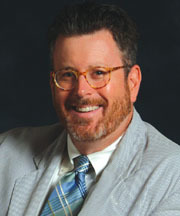
In many ways, the story of how Mike Desch came to join the University of Notre Dame faculty is a familiar one: Leading scholar gets offered a position at a different university and must carefully weigh his options, with would-be colleagues telling him how excited theyd be to have him and the current institution asking him to stay.
But Desch also received some especially high-level advice – a conversation with former President Bush – before making his decision.
The namesake of Texas A&Ms Bush School of Government and Public Service, where Desch had been on the faculty since 2004, the 41st president told the international relations expert how valuable he was to that university. Flattered by the sentiment, Desch nevertheless made the difficult choice to move, accepting a position as a professor in Notre Dames Department of Political Science.
What tipped the balance for me was the fact that Notre Dame is a great Catholic university, with equal emphasis on both adjectives,he says. Desch, who was the Bush Schools first Robert M. Gates Professor of Intelligence&National Security Decision-Making and the founding director of its Scowcroft Institute of International Affairs, starts in his new position this fall.
Mike Desch is a distinguished addition to our department,says department chair Michael Zuckert, Nancy Reeves Dreux Professor of Political Science.He is not only an eminent scholar in the field, but he has a track record as a program-builder. He has, for example, been planning a new initiative to bring in speakers and fund activities for the international relations faculty. He also has been exploring the implications for Notre Dame of the new Minerva program to be sponsored by the Department of Defense.
Deschs most recent book deals withdemocratic triumphalism,a term he coined to describe an emerging belief among scholars and policymakersthat democracies are uniquely virtuous and capable in international affairs.He notes that those who embrace this idea tend to assume democracies wont go to war with each other.
Recently, a variation of this argument has attracted lots of attention: the belief that when democracies go to war with non-democracies, they are more likely to win those wars,he said.
InPower and Military Effectiveness: The Fallacy of Democratic Triumphalism,published earlier this year by the Johns Hopkins University Press, Desch shows that the statistics used to support this theory are flawed. He argues that democracy and military effectiveness have their roots in the same factors, such as high levels of aggregate wealth and development, but that the one does not predict the other, meaning their relationship is coincidental and not a case of cause and effect.
This finding is important not only analytically, but it also has important policy implications,says Desch, who will teach three undergraduate courses and a graduate seminar this year.To whit, democracies should not overestimate their military prowess, as we unfortunately did in Iraq.
Like many others who decide to come to Notre Dame, Desch does have a family connection to the University, although fittingly, there is a distinctive twist. While both his grandfather and his dad were alumni, Grandpa Gus played football and ran track for Knute Rockne, as well.
President Bush, Gen. [Brent] Scowcroft, Secretary [of Defense Robert] Gates have all been very understanding of my decision, particularly once they learned of my family connection to ND,Desch says.I am hopeful that well be able to get them to visit South Bend down the road.
TopicID: 28946